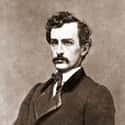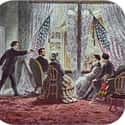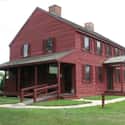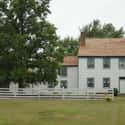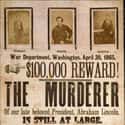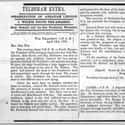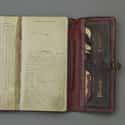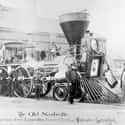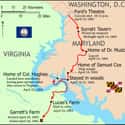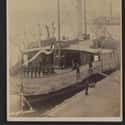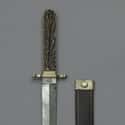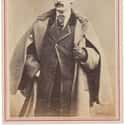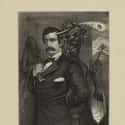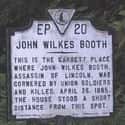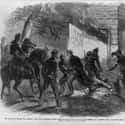-
(#1) November 1864: Booth Originally Planned To Capture Lincoln
Slaying Abraham Lincoln was not Booth's original plan. After Lincoln was re-elected president in 1864, Booth and his compatriots hoped to capture Lincoln and trade him for Confederate POWs. They first planned to grab Lincoln at Ford's Theatre, lowering him from his box to the stage with ropes. A second plot involved intercepting Lincoln in March 1865 while he was traveling, but the president's schedule changed.
With the conflict winding down and Union victory inevitable, Booth decided to take more drastic action.
-
(#2) April 14, 1865: Booth Shot Lincoln In Ford's Theatre
Booth's plan was for a group of men to take out four key Union officials on the same night: President Abraham Lincoln, Vice President Andrew Johnson, Secretary of State William Seward, and General Ulysses Grant. The organizers believed this would throw the Union into chaos, allowing the defeated Confederacy to reorganize and take Washington.
It wasn't until later that Booth learned every attempt but his own had failed; he was too focused on his mission. Using connections he had developed over the years as an actor, he got access to the presidential box on April 14, 1865, during a performance of Our American Cousin. No one noticed the handsome young actor enter the box, pull out his derringer, and point it at the back of Lincoln's head.
Booth shot Lincoln at 10:15 pm. Immediately after, he rushed past onlookers, intending to jump from the balcony to the stage. On his way, Army officer Henry Rathbone tried to stop him. After sinking his knife into Rathbone's shoulder, Booth leaped from the presidential box, landing awkwardly and seemingly breaking his leg.
There was confusion in the audience, with some bystanders saying they thought it was all part of the play until they heard Mary Todd Lincoln screaming. Onstage, Booth yelled, "Sic semper tyrannis" (Thus always to tyrants), which was the state motto of Virginia. It was also famously associated with Brutus, the man who did away with Julius Caesar. Booth had played the character onstage and might have felt a kinship with Brutus.
-
(#3) April 14, 1865: Booth Narrowly Escaped From Washington, DC
With Abraham Lincoln lifeless, the theater in an uproar, and Union troops around every corner, Booth had to get out of Washington as quickly as possible. One of his co-conspirators had placed a horse at the stage door. Booth mounted it and rode down to the Navy Yard Bridge, which led from Washington to Maryland.
After almost being stopped at the bridge by a guard, Booth continued and met up with David Herold, another member of the group. Together, they rode to Surratt's Tavern in Surrattsville, MD (now called Clinton), where the proprietors had agreed to hide supplies for the two of them.
On the night of April 14, they rode away from the tavern, heavily armed.
-
(#4) April 15, 1865: A Doctor Treated Booth's Broken Leg
Booth and David Herold arrived at the Maryland home of Dr. Samuel Mudd by 4 am on April 15. Mudd was a physician in a town with well-known Confederate sympathies, although it's unclear whether he knew exactly who these two men were or what they had done; he later proclaimed his innocence but was sent to prison anyway.
Mudd set Booth's broken leg and sent him to rest for a few hours. While Booth was lying in bed in Maryland, Lincoln was lying in bed in Washington as the attending physician pronounced him officially perished.
When Booth rose, the fugitives continued riding. They got lost near Zekiah Swamp before paying a nearby farmer for help in getting to "Rich Hill," the home of Confederate sympathizer Samuel Cox. The distances were vast, and Booth could not travel as fast as he would have liked due to his leg. It was 1 am by the time they reached Rich Hill.
-
(#5) April 16, 1865: Confederate Sympathizer Samuel Cox Hid Booth And Herold In A Pine Thicket
Samuel Cox received Booth and David Herold warily when they arrived at his house on April 16. While Cox supported their cause, he also knew the danger he was exposing himself to in sheltering them. So, he sent them to a nearby pine thicket at the edge of his property where they could wait for the opportunity to cross the Potomac into Virginia.
Booth spent the day fuming that they weren't allowed in Cox's house and adjusting to the uncomfortable pine thicket. It was Easter Sunday.
Meanwhile, around 1,000 Union soldiers had been mobilized in the search for Booth, and the bounty for the group was up to $100,000, the equivalent of about $1.5 million today.
-
(#6) April 17, 1865: Booth Was Surprised To Learn People Weren't Praising Him
On April 17, Booth and David Herold continued to hide in the pine thicket; they stayed there for four days total. Occasionally, Thomas Jones, a friend of Samuel Cox, visited them and brought the two food, drink, and newspapers.
Booth was particularly curious to see how the world was reacting to his "heroic" act. When he saw himself roundly condemned as a coward and villain, it shocked him. In planning it, he had genuinely thought of himself as a tragic hero, like Brutus in Shakespeare's Julius Caesar.
A few days later, Booth wrote in his diary:
I am here in despair. And why? For doing what Brutus was honored for, what made [William] Tell a hero. And yet I for striking down a greater tyrant than they ever knew am looked upon as a common cutthroat.
-
(#7) April 18, 1865: While Hiding In The Pine Thicket, Booth Wrote In His Journal
On the third day in the pine thicket, April 18, Booth and David Herold grew restless. They had good reason to remain hidden, though, as it is estimated that at one point a column of Union soldiers passed within 600 feet of their hideout.
Spooked by the huge hunt and worried that the horses the two men were hiding with were making too much noise, Herold silenced the animals.
Booth may have been writing in his red leather diary at that moment. It's unclear when he began keeping the journal, but it remains the only firsthand account of his thought process during this period. In it, he railed against the "persecution" he was facing and seemed genuinely surprised he was not being treated as a hero.
-
(#8) April 19, 1865: While Soldiers Searched For Booth, Lincoln's Procession Began
On April 19, Booth and David Herold drank whiskey and continued to lay low. Not far away, the country gathered to mourn Abraham Lincoln. In Washington, DC, enormous crowds came to watch the procession as Lincoln's body was carried to the rotunda of the Capitol building. Once there, a small, private service was held for a few select mourners.
The next day, the rotunda was opened to the public, allowing citizens to see their president one last time. The day after that, Lincoln's body was placed aboard a special train, and Mary Todd Lincoln accompanied it to Springfield, IL, for the interment.
-
(#9) April 20-21, 1865: Booth And Herold Got Lost On The Potomac River And Ended Up Back In Maryland Instead Of Virginia
At long last, Thomas Jones, after learning that soldiers in search of Booth had left the area, came to Booth and David Herold to tell them they had a chance to make their exit. They set out at dusk on April 20, six days after the fateful event.
The Potomac River was 3.5 miles away by foot, and it's likely they moved even slower due to Booth's still-recovering leg. When they eventually reached the water, Booth tried to pay Jones for his services, but he refused. Instead, Jones put the two men on a small skiff and sent them off onto the Potomac.
For the second time, the two men became hopelessly lost. They had planned to land the boat at Machodoc Creek in Virginia, but it was a foggy night and they ended up instead at Nanjemoy Creek in Maryland.
Booth and Herold went to a farm near Nanjemoy Creek and managed to get some provisions before returning to the skiff. Then, for reasons that remain unclear, they did nothing. Perhaps Booth's leg was acting up, or they heard rumors of Union patrols nearby. But for the night of April 21, they remained on the boat at Nanjemoy, not escaping via the Potomac as planned.
-
(#10) April 22, 1865: Booth And Herold Were Almost Caught By Union Soldiers
On April 22, Booth and David Herold waited for night to fall before leaving by boat on the Potomac. It was another foggy night, and while they may have initially cursed their bad luck, it ended up working in their favor. Booth's diary records show they nearly crossed the path of a Union gunboat patrolling the river. But the escapees managed to stay out of the way of the ship and continued rowing late into the night.
By this point, the Union was closing in on Booth and his associates. Dr. Samuel Mudd's house was surrounded by troops and everyone at Surratt's Tavern had been detained. The authorities knew Booth was trying to get to Virginia, and the roads were full of Union soldiers.
-
(#11) April 23, 1865: Booth And Herold Landed In Virginia And Were Denied Shelter By Several People
Booth and David Herold finally landed in Virginia early in the morning of April 23. They quickly made contact with Elizabeth Queensbury, a sympathizer. After feeding the men, she sent them on to Dr. Richard Stuart a little farther south. When Stuart realized who they were, he kicked them out, and they made their way to the cabin of William Lucas, a free Black man.
Like Stuart, Lucas refused to let them spend the night. This incensed Booth, who accosted Lucas with a knife (the same one used on Henry Rathbone) and made the man and his family spend the night on the porch.
-
(#12) April 24, 1865: Booth And Herold Arrived At Richard Garrett's Farm And Convinced Him They Were Soldiers
After taking over the home of William Lucas, Booth and David Herold forced Lucas's son to take them to Port Charles, where a former Confederate soldier, Willie Jett, had prepared a house for them. The house in question was occupied by two unmarried women, however, and the men agreed it would be improper for them to stay there.
They continued, eventually coming to a house owned by Richard Garrett on April 24. Booth managed to convince Garrett that he and Herold were soldiers and Booth's broken leg was obtained during duty. Garrett seemed to believe him and, for the first time in a week, Booth had a real bed on which to sleep.
-
(#13) April 25, 1865: The Garretts Moved Booth And Herold From Their House To A Barn
On April 25, Booth slept in, drank whiskey, and played with Richard Garrett's children. By nightfall, the Garretts grew suspicious of their visitors and insisted they spend the night in the barn. Grudgingly, Booth agreed, and both he and Herold bedded down there.
It proved to be the last night of Booth's life.
-
(#14) April 26, 1865: Union Soldiers Originally Tried To Take Booth Alive
Before they went to bed on April 25, the Garretts locked the barn, likely fearful that their guests would try to take their horses. Union soldiers then received a tip about Booth's whereabouts. It wasn't the Garretts, however, who tipped them off, but Willie Jett, the Confederate soldier who had previously helped the fugitives.
Around 2:30 in the morning on April 26, Booth awoke to the sound of cavalry approaching the barn from the main house. He woke David Herold, and the two tried to escape, only to find the barn door locked.
A standoff ensued. The Union forces could have easily taken the barn, but it was known that Edwin Stanton, the Secretary of War, wanted Booth alive. During the standoff, Herold begged Booth to be released. Eventually, Booth agreed, and Herold surrendered to the Union forces.
But there would be no surrender for Booth.
-
(#15) April 26, 1865: Booth Tried To Duel The Union Commander For His Freedom
"I have too great a soul to die like [an offender]," Booth wrote in his journal just a few days before his fateful standoff at Richard Garrett's farm. Yet there he was, skulking in a barn, surrounded by Union cavalry. When the Union soldiers started laying kindling outside the barn, Booth knew they weren't planning on waiting much longer, so he offered to duel the commanding officer for his freedom.
The Union commander declined and set fire to the barn. As Booth came charging out, he was shot in the neck by a young soldier named Boston Corbett.
In the last moments of his life, Booth asked one of the soldiers to hold up his hands. Looking at his own hands, Booth muttered "Useless, useless." And then, at 7:15 am, he passed.
New Random Displays Display All By Ranking
About This Tool
When John Wilkes Booth assassinated Abraham Lincoln, he was neither the most famous nor the best actor in the United States. John Wilkes Booth's determination and ambition drove him to do things that other actors of the 19th century would not dare to take risks on stage. He sympathized with the Confederacy and was very dissatisfied with the outcome of the Civil War.
On April 14, 1865, President Lincoln was assassinated by him. On April 26, 1865, the murderer John Wilkes Booth was shot dead by the police while on his way to escape. The random tool introduced 15 details about the timeline of the hunt for John Wilkes Booth.
Our data comes from Ranker, If you want to participate in the ranking of items displayed on this page, please click here.











